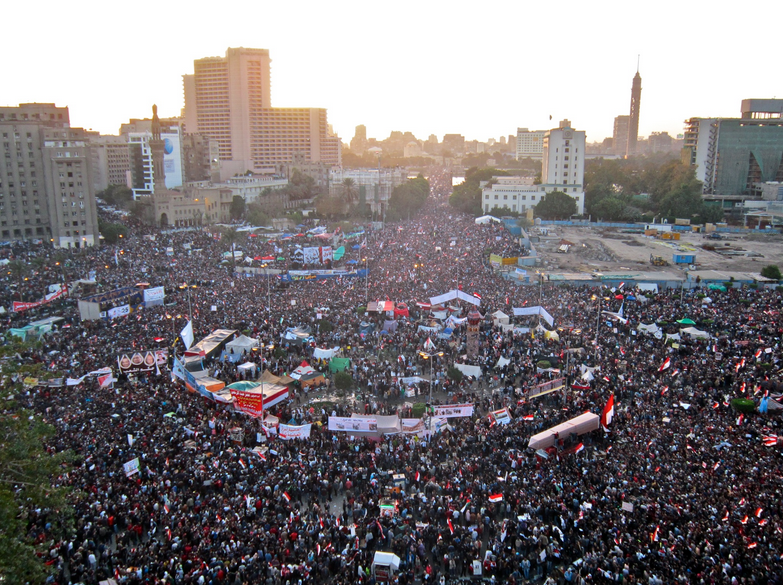Egypt Today's “The Week in Quotes” turns its focus to the fourth anniversary of the January 25 Revolution
By Egypt Today Staff
This January 25 marks the fourth anniversary of what began as the 2011 revolution that led to the ouster of former President Hosni Mubarak. Like every year since January 25, 2011, how the revolution has been remembered by the state and society has changed depending on the political circumstances of the time. This year is no different.
There would be no state sponsored ceremonies on this anniversary of January 25, after President Abdel Fattah Al-Sisi announced on January 23 that celebrations for Police Day and the anniversary would be canceled after a seven-day nationwide period of morning for the death of Saudi Arabia’s Kind Abdullah bin Abdul Aziz.
Cabinet spokesperson Hossam al-Quwaish later stated that celebrations would be postponed instead of canceled.
The government announced that Tahrir Square, which was a focal point of protests during the 18 day uprising in 2011, would be closed and off limits. The government also declared January 25 a national holiday, which has kept many people at home. Streets that are usually heavy with traffic around Cairo and in the Downtown area were quiet and mostly deserted, while some gatherings were dispersed by police.
According to The Cairo Post, protests and large crowds have been banned and will not be tolerated due to the seven-day period of mourning for King Abdullah. Despite the ban, several groups, including April 6 Youth Movement, Al-Jamaa Al-Islamiya, Students Against the Coup, and the Muslim Brotherhood, announced calls for protest ahead of the January 25 anniversary, according to Daily News Egypt.
While gatherings on January 25 have been banned, a march on January 24 in Talaat Harb that hoped to honor those killed during the revolution was marred with blood after a protester was killed by a pellet wound.
Shaimaa El-Sabagh, who was marching with the Socialist Popular Alliance Party, was shot during a procession to Tahrir Square as her and other marchers carried a wreath to lay in the square to honor the dead.
The Interior Ministry denied that she had been gunned down after police moved to disperse the march with pellets and tear gas, stating that she was injured, hospitalized and later succumbed to her wounds.
On January 25 Egypt’s prosecutor general announced that it would order an investigation into El-Sabagh’s death.
Despite the ban on protests on January 25, some demonstrations and marches took place to voice different concerns about the anniversary. AFP and Ahram Online reported that an Islamist protester had been killed in Alexandria after demonstrators fought with police in the streets. Reports on Twitter by several journalists claimed that some pro-Sisi gatherings could be found in areas around Tahrir Square, while Reuters reported that several pro-Muslim Brotherhood gatherings took place near the square.
Police also reportedly used tear gas to disperse protesters in Ramses Square, while Rabaa Al-Adaweya Square, where hundreds of pro-Mohamed Morsi protesters were killed in August 2013, was on lockdown.
An explosive device that went off outside a sports club in Heliopolis wounded two police offers on January 25. In Beheira, two people were killed after bombs they were planting exploded, according to Reuters.
In 2011, an estimated 800 people were killed between January 25 and February 11, the day Mubarak announced he would step down. On January 25 last year, 2014, 108 people were killed during demonstrations, according to Wiki Thawra.
Quotes on January 25
[caption id="attachment_107571" align="alignnone" width="783"] Tahrir Square on January 25, 2011 (photo from Wikimedia)[/caption]
Tahrir Square on January 25, 2011 (photo from Wikimedia)[/caption]
“It is unreasonable and unacceptable that the blood of Egyptians who want to express their views peacefully continues to be spilled four years after the glorious revolution.” – Hamdeen Sabahi, former presidential candidate, in a Facebook post commenting on Shaimaa El-Sabbagh’s death.
“To fulfill the demands of the revolution, bread, freedom, and social justice, there must be a revolution inside us that shall push us forward in all fields.” – said President Abdel Fattah Al-Sisi during a televised speech on January 24.
"The Egyptian Revolution is moving steadily towards its goal: the ultimate defeat of the illegitimate coup. The revolutionary will of the Egyptian people in all squares and streets across the country will not back down, despite all the barbaric junta tactics which include killing unarmed protesters, and arbitrary arrest and detention by coup security authorities." — Anti-Coup Pro-Legitimacy National Alliance in a statement on January 25.
“Unprecedented! Egypt announces seven days of mourning for death of Saudi monarch! We have never had more than three days of mourning for anyone before.” — Shahira Amin, an Egyptian journalist, on Twitter.
“I don’t regret the revolution, never did and never will. It’s one beautiful major turning point in my life.” — Reem Khorshid, an Egyptian blogger, on Twitter.
“If protests materialize, there will likely be blood on the streets.” — Louisa Loveluck, a journalist based in Cairo, on Twitter.
Comments
Leave a Comment